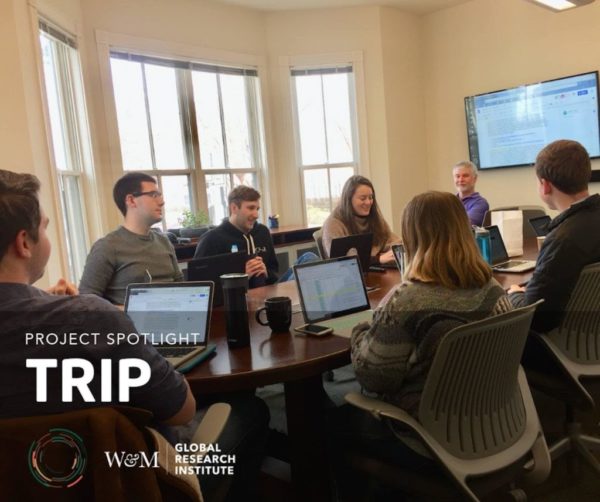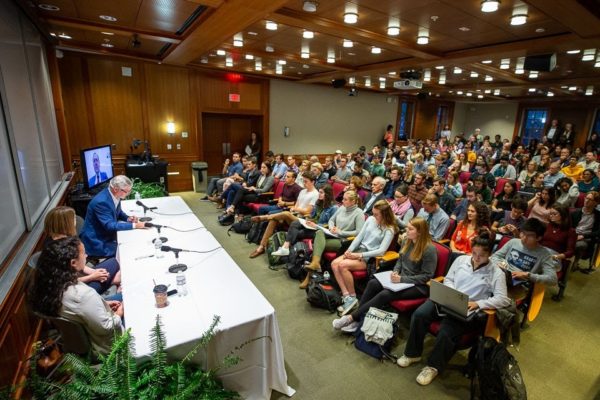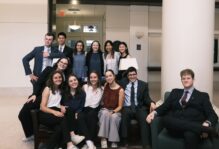IR at Work: An Undergraduates Experience with TRIP
By Moria Johnson ’20
The Teaching, Research, and International Policy Project, fondly known as TRIP, was founded in 2003 at William & Mary and is probably one of the more obscure projects hosted by the GRI. One of the most frequent questions I receive about my research is: “what exactly do you guys do?” For many of the projects hosted by the GRI, their purpose is in the name: Aiddata, International Justice Lab, Center for African Development, etc. But understanding TRIP has always been a fun puzzle for myself; even I didn’t really know what I was getting myself into when I first joined the team. As a Government major who focused most of her studies on security issues, I really only understood small pieces of International Relations (IR) theory. After working at TRIP for about a semester, I finally found the words to describe TRIP’s research: meta-IR. The most succinct way I’ve found to explain what it is we do is “bridging the gap.” TRIP works to analyze the connections between teaching, research, and international policy by creating datasets for teaching and research (because international policy already gets quite a bit of attention).
We study what International Relations scholars study, what they turn around and teach to the next generation of scholars and policy makers, and what policymakers take and apply to policy proposals. It’s one giant positive feedback loop; a window into itself that grants us a much better understanding of our own discipline.
While it seems as though this work may be a bit dry (because let’s be honest: nobody really likes Intro to International Politics, with all of its theories, scholars, and whatnot, even if it was taught by your favorite undergrad professor), I found it to be quite the contrary. TRIP gave me the opportunity to see IR at work in the world around me. I spent the last two years of my undergraduate career doing two things: surveying journalists and policymakers and reading the Op-eds that policymakers say they get their information from.
After surveying policy makers at the end of 2017, TRIP compiled a list of the news sources that policy makers indicated as their biggest sources of knowledge when it came time for them to enter unfamiliar territory in the policy realm. TRIP RAs tirelessly scanned these blogs for IR knowledge, issue areas, and their alignments towards scholarly consensus in order to understand what it was that academia and journalists were telling the people informing and creating present foreign policies.
We got to see all of our countless hours reading Lawfare, The New York Times, and the Wall Street Journal pay off in November of this past year. TRIP RAs were able to meet with foreign affairs journalists during our Foreign Affairs Journalist and Scholars conference. It was fascinating to be able to meet these journalists whose bodies of work we were already so familiar with. Many of our attendees occupied gray spaces in the world of IR knowledge – some were professors based in academia but prolific writers for IR blogs and journals, others were think tank experts who also fulfilled roles as academics and journalists. Being able to see the connections between TRIP’s theoretically-based research and its real-world applications was so satisfying to see as an undergraduate researcher.
I spent half of my undergraduate career at TRIP and I can’t even begin to describe the impact it has had on my academic and professional lives. TRIP made me more curious – who even thought to study the study of IR? TRIP made me a better researcher – what does it mean to find “unfindable” knowledge? TRIP made me a better writer and editor – yes, this is a shameless plug for the TRIP RA Blog. But most importantly, TRIP made me unafraid to ask the questions we sometimes don’t want the answers to – why is it that this administration cares little for the advice of academic experts and career diplomats? Who broke the coffee machine at 427?






No comments.
Comments are currently closed. Comments are closed on all posts older than one year, and for those in our archive.